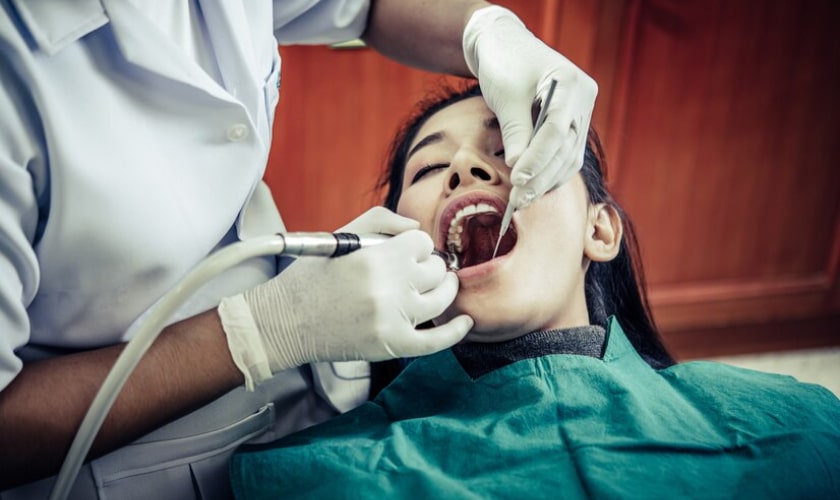If you have ever experienced a dental emergency, you know it can be frightening and painful. But knowing how to handle these types of emergencies is crucial in ensuring the best outcome for your oral health. This article will discuss the essential steps to take during a dental emergency and how to prepare for such an occurrence.
If you experience a dental emergency, it’s important to know how to handle the situation. This guide will cover the essential steps to take in a dental emergency, from finding a dentist to getting treatment.
Dental emergencies can be frightening, but staying calm and taking action as quickly as possible is important. The first step is to find a dentist who can provide treatment. If you don’t have a regular dentist, you can search for one online or call your local dental society. Once you’ve found a dentist, make an appointment as soon as possible.
Causes of Dental Emergencies
There are many possible causes of dental emergencies. Some common causes include:
-Tooth decay or infection: This can happen when plaque and bacteria build up on teeth and gums, causing them to become inflamed and infected.
-Trauma to the mouth: This can happen due to a fall, blow to the face, or other accident. It can cause teeth to be knocked out, cracked, or chipped.
Gum disease happens when the gums become swollen and inflamed due to plaque and bacteria buildup. It can eventually lead to tooth loss if left untreated.
-Orthodontic problems: This can happen when braces or other dental appliances put too much pressure on the teeth and gums, causing them to become irritated and inflamed.
Symptoms of a Dental Emergency
Some of the most common symptoms of a dental emergency include the following:
– Severe toothache: This is often one of the first signs that something is wrong with your tooth. If you are experiencing a severe toothache, it is important to see a dentist immediately, as this could indicate an infection or other serious problem.
– Bleeding gums: If your gums are bleeding, this could be a sign of gum disease. However, it can also be caused by other factors, such as trauma to the mouth or brushing too hard. Regardless of the cause, if you notice bleeding gums, you must see a dentist as soon as possible.
– Loose teeth: If one or more of your teeth feels loose, this is an emergency that requires immediate dental attention. Loose teeth can be caused by many things, including gum disease, trauma, and even clenching or grinding your teeth at night.
What to Do Immediately in Case of an Emergency
If you are experiencing a dental emergency, the first thing you should do is call your dentist. If you don’t have a regular dentist, you can call an emergency dentist or visit the nearest hospital emergency room.
If you are bleeding, try to control the bleeding by rinsing your mouth with warm water and applying pressure with a clean cloth. If the bleeding does not stop, go to the emergency room.
If you have a tooth knocked out, try to put it back and bite down on a gauze pad or piece of cloth to keep it in place. If you can’t put the tooth back in, put it in milk or water and get to the dentist as soon as possible.
When to Seek Professional Help
If you have a dental emergency, it is essential to seek professional help as soon as possible. You should seek professional help for many reasons, but the most important reason is that your oral health is at risk. If you wait too long to seek professional help, your oral health could worsen, and you could even develop an infection.
How to Prevent Dental Emergencies
The best way to prevent dental emergencies is to practice good oral hygiene and see your dentist regularly. Be sure to brush and floss your teeth at least twice a day, and visit your dentist for a professional cleaning and checkup at least once every six months.
If you have any existing dental problems, treat them as soon as possible to avoid further complications. Wear a mouthguard to protect your teeth from injury if you play sports. Don’t hesitate to ask your dentist if you have any questions or concerns about your oral health.
Conclusion
We hope this guide has provided you with the information and tools necessary to handle a dental emergency. It is important to remember that prevention is better than cure, so ensure good oral hygiene. If you experience a dental emergency, immediately contact your dentist and follow the steps outlined in this article. With these tips and advice, you can be well on your way to getting back on track with your oral health!
FAQ
What types of emergencies can I expect at an emergency dental office?
Injuries and accidents are common reasons for needing emergency dental care. A toothache can be caused by many things, including a tooth that has been knocked out, stuck, or cracked; an infection in the gum or tooth; or even a broken tooth. You will most likely be seen within 30 minutes of arrival at the office. The doctor will discuss the best way to treat your problem with you so that you know what to expect when you arrive at the office next time.

